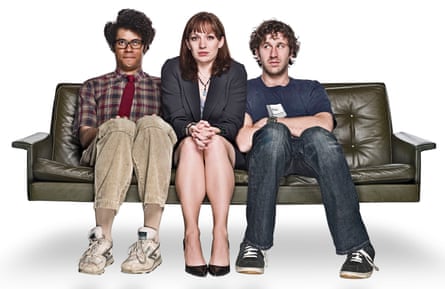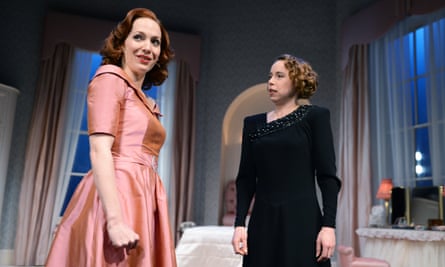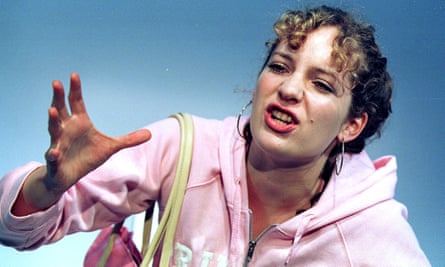It’s break time at a rehearsal space in south London and Katherine Parkinson keeps looking at the paper bag containing her very healthy lunch with a mixture of hunger and disappointment, a look familiar to any ravenous person who has ever opened the fridge to find only a piece of furred cheese. “One of the actors is on a regime,” she says, an eyebrow just perceptibly raised. “It’s intimidating me.” She takes a gulp of green juice, then says, mainly to herself: “That’s disgusting.”
She is two weeks into rehearsals for Dead Funny, the comedy written and directed by Terry Johnson (it was first on in 1994). Parkinson plays Ellie, unhappily married but craving a baby. Her husband, Richard, is chair of the Dead Funny Society – a club, almost exclusively male – that celebrates extinct comedians. It is the week that Frankie Howerd and Benny Hill have died, and the news has spread mawkishly among them. A party is planned, where there will be revelations and fall-outs, amid the commemorative custard pies and routines learned by rote.
They’ve just been rehearsing the party scene. In it, Ellie has told a horrible joke. “I have to say a few lines that are quite, for want of a better word, dark,” says Parkinson. “I like that she lets herself down, because she’s unhappy and she starts to become a little bit bitter. You can see her realising she’s becoming that person. Sometimes when you do a comic character, it’s all about getting the audience on side and that’s not quite as interesting to play as someone who makes them laugh and then maybe makes them go: ‘Ooh, that was bad taste.’” She remembers watching Laura Wade’s play Posh, “and there were things [in it] that shouldn’t get a laugh, and there was a guy in a pink shirt in front of me going ‘ha ha ha’.” She puts on a braying honk. “It’s like, you’ve just revealed yourself to be an absolute tosser.”

Steve Pemberton – “just about my favourite actor in the world” – plays Brian, one of the members of the society. At one point, he turns and says to Ellie: “Don’t talk comedy to us,” with all the disdain of a sixth-form comedy nerd dissecting Spinal Tap. Parkinson has worked in comedy for years – most famously as head of the tech department in Graham Linehan’s series The IT Crowd. “I have met plenty of people my generation who get geeky about comedy, and I’ve always found it most bizarre because one thing they don’t have is humour.” She smiles. “Men. I’m talking about men. When a sort of ownership happens, I’ve always felt quite excluded by that; it’s just men quoting things from things. It’s an avoidance actually, I think. There’s a safety in communicating your humour by something that’s already been tried and tested, rather than trying something new and in the moment.”
She doesn’t particularly think that men and women have a different style of humour, as the play suggests, “but the cataloguing jokes thing is a male ritual. It’s like collecting football cards or whatever.” She pauses and laughs. “I’m just slagging off men.” Then, in a funny, earnest voice: “Whereas women celebrate humour with joy, and it’s about social interaction and generosity of spirit.”
Parkinson grew up on Only Fools and Horses, French and Saunders, Tony Hancock. Her parents were academics – her mother was a teacher, and her father is the historian Alan F Parkinson. “I remember being really impressed if my dad was made to laugh. It was a big thing in our house.” Her first proper memory of being on a stage was when she was cast as one of four Pucks in a school production of A Midsummer Night’s Dream at 13, and she remembers how comfortable it felt. “It was probably quite obvious I was that way inclined.” Why?

She smiles. “I’ve always wanted people to like me. It’s disgusting, and not very cool to admit it, but that’s basically where it comes from. I think I was probably quite shy, but then not when I was given a platform – and I think that’s quite typical. I was more relaxed on stage than off. But I don’t want to make out …” She stops. She has read about the type of actors who were cripplingly shy and whose first utterances were lines in an Ibsen play or something, and says she wasn’t quite that bad. “Actually, say that – say I went to drama classes to bring me out of my shell, that I didn’t speak until I was 10 on stage.” She laughs. “Yeah, I like that.”
She didn’t know any actors, or really think it could be a proper job, until she got to university – Oxford, where she read classics, via grammar school in Kingston upon Thames where she grew up – and “there were people who were acting and expecting to do it”. She found Oxford intimidating at first, eventually building up the courage to audition for a play – A Midsummer Night’s Dream again. She got the part as Titania “because my hair was very long and wild. And then I was off, really. I just found that there were a lot of really fun people doing acting and it meant I had a legitimate excuse not to do my work. For me, it was opting out, because I got a bit overwhelmed by the academic thing. Which is why when I meet people who are really driven in acting I’m always a bit surprised because as far as I’m concerned, we’re all drop-outs.”
How does she feel about the domination of acting by people from public school and Oxbridge backgrounds? She agrees it’s a problem. One of her first jobs out of Lamda, the drama school she went to after university, came from an Oxford connection, she says: “It’s definitely true that going somewhere like that helps.” But if that hadn’t happened, she wouldn’t have been able to afford to spend most of her early 20s trying to be an actor. “I didn’t have any money to fall back on,” she says. Those who can keep at it, riding out the years of failed auditions and bit parts, “tend to have a private income, which means [acting is full] of a very small representation of the social demographic. It works quite well because there are so many period parts, posh parts, but I do think that’s a shame. I’ve seen people who were so talented who have had to drop out.”
Parkinson’s first big television role was as receptionist, Pauline, in the Martin Clunes drama Doc Martin; before that, she had small parts in Casualty and Extras, and in her friend Katy Brand’s show. Her role as Jen in the IT Crowd brought her something close to a cult following (it was that sort of show), as well as two British comedy awards and a Bafta. More recently, she was in the heavyweight Hugo Blick drama The Honourable Woman, and Kay Mellor’s pregnancy drama In the Club. In theatre, she has done Before the Party at the Almeida, Season’s Greetings at the National and was in the Royal Court’s sparkling production of The Seagull, with Kristin Scott Thomas, Chiwetel Ejiofor and Carey Mulligan. “It is not necessarily the most famous names that come off best,” noted the Guardian’s critic Michael Billington, describing Parkinson’s performance as “brilliant”.

She says she can’t complain about the parts she’s had, though, like many female actors, she has suffered constant irritations. “I’ve read scripts that describe the woman as ‘feisty’ and I just think that is criminal now,” she says, green eyes widening. “I just don’t think there is any excuse now to describe any female part as ‘her own person’ or ‘feisty’. What does it mean in this day and age? It’s amazing how much that comes up. I think ‘feisty’ should be banned from all character descriptions. I have to say I don’t feel badly served at the age I am.” A wry smile. “But that’s probably because I was never getting parts for my tits and ass.”
Most recently, she has been in Humans, the brilliant Channel 4 drama about the rise of humanoids known as synths, playing the harassed lawyer and mother-of-three, Laura. She can’t say much about the second series, which is about to start, only that “it’s all gone quite global and some really surprising things happen”. How has Laura changed? “She’s got better hair,” she says with a laugh. (They made Parkinson look impressively dowdy in the show, obviously done to contrast with the synths’ perfect aesthetic. In person, Parkinson is strikingly beautiful.) “She was very anti the synths and now she’s their champion. She is concerned with the ethics and she feels, rightly, if it can think and it can feel then it has to have rights. I love the philosophical element to it. Laura says in this series ‘there are two types of people – the person who stops to help the boys who have broken down by the side of the road at night and the one who wants to go on because the kids are in the back’. I think it’s an interesting, thoughtful programme.”

Parkinson has worked solidly, barely taking time off after the births of her two young children (she has two daughters with her husband, the actor Harry Peacock). Does she ever – how to put this? – look at the Hollywood careers of, say, her IT Crowd co-stars Chris O’Dowd and Richard Ayoade and feel a bit left behind? “I don’t,” she says. “I’m not surprised by their success. I always felt like Chris would go to America because he works, he fits in to those Judd Apatow films, and Richard is a sort of genius, so he was always going to have quite an idiosyncratic path and take over the world. I feel pleased and proud of them. I’m not trying to say I’m less ambitious than them, but where I’m focused at the moment is British work and theatre. I’ve never set foot in America and I’m just going to assume they don’t want anything to do with me. I’m a bit scared of it, really.” Why? She smiles. “I suppose I’m a bit scared of the brutality, the stories I’ve heard, the auditioning. I don’t want something to tell me to get something fixed on my face, I’d just go into the foetal position and won’t get over it. I’m too sensitive.”
She and her husband talk, only half-jokingly, about trying to break Hollywood in their 60s, “and get those parts that older British people get”. They have just finished watching the series Fargo, and she says she didn’t feel envious, except she just as quickly changes her mind. “I’m just realising how much I’d like to do something like Fargo. Everything I’ve said is bollocks. Let’s go.” We must, I think as she gets back to work, do everything we can to keep her.
The new series of Humans is on Channel 4 from 30 October; Dead Funny opens at the Vaudeville Theatre, London on 27 October.

Comments (…)
Sign in or create your Guardian account to join the discussion